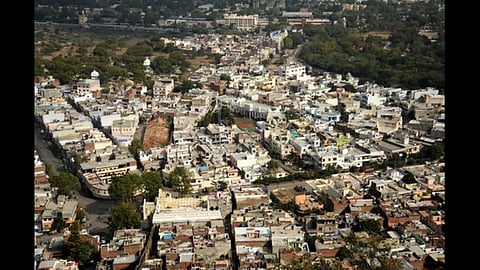After jostling your way through the mad rush of devotees entering the Shrinathji Temple in Nathdwara–a pilgrim town in Rajasthan–tarry a while as you have a ‘darshan’ of the deity. Look beyond the idol, at the painting which serves as a backdrop. Because this is what has added a special chapter to Indian art. Known as Pichhwai, these backdrops are part of the Nathdwara school of miniature art, a subsect of the Mewar school of painting.
Pichhwai: The Divine Backdrop
Unique to Nathdwara in Rajasthan, Pichhwai artworks are now sought by art collectors and can be found in museums around the world

Lying about 45km away by road from the lake city of Udaipur, Nathdwara is a highly revered pilgrim centre for the Vaishnavites, especially those who belong to the ‘Pushti Marg’ sect (founded by Shree Vallabacharya). Shrinathji is considered a reincarnation of Krishna.
The idol–carved in bas relief on black stone–represents Krishna aged seven years, where he is seen symbolically raising Giri Govardhan in his left hand while his right hand rests on his waist. A diamond shines on his chin. Adorned with rich clothes and ornaments (some believed to predate the Moghul period), the idol looks very different from the typical icon of child Krishna. It is said that Vithalnath, the son of Vallabhacharya, introduced the cult of Shrinathji.
The sprawling ‘haveli’ of Shrinathji is located in the heart of the town and you have to negotiate crowded, shop-filled lanes before you reach it. According to popular belief, the idol was originally installed in a temple in Mathura; when the city was under the threat of an attack by Emperor Aurangzeb’s army, the custodians of the temple took down the idol and escaped to Rajasthan (according to some sources, the idol remained in Agra for nearly six months). Maharaja Raj Singh of Mewar offered to shelter the idol. As the idol was travelling to Mewar, the wheels of the chariot (or bullock cart, according to some sources) got stuck in mud in a village called Sihad on the Banas River, which was taken as a divine signal that the deity wished to settle down in that village. According to records, the worship of Shrinathji in his new abode began in the late 17th century.
With the temple as the centre of attraction, a town developed around it and came to be known as the doorway (dwar) to god (nath). People from various professions, such as potters, weavers, silversmiths, carpenters, and cooks, began to settle here, offering their services to the deity and the temple, and the pilgrims who began to arrive as the word spread around.
Like in other Krishna temples, Nathdwara too became known for its various festivals, such as Holi, Janmashtami, Nand Mahotsava, Govardhan Puja, Annakuta, Diwali, etc. To symbolise the different seasons, the events in the life of Krishna, and the festivals, representative paintings would be hung behind the idol. According to many art historians, it was this ritual that earned the paintings the name of ‘Pichhwai’ (roughly meaning ‘pichh’ or back and ‘wai’ or painted textile).
Gradually, the Pichhwai paintings began to gain popularity and were bought by the followers and pilgrims to be hung at home, often with the image of Shrinathji painted within decorated borders. Some commissioned ‘manorath’ paintings as reminders of their pilgrimage to Nathdwara and their communion with the divine. Pichhwai largely deals with stories related to the life and times of Krishna, including the festivals. Apart from representative images of Shrinathji or Krishna, trees and floral designs, cows and peacocks, etc. are some of the popular motifs used for illustration. It is also not unusual to find the use of precious stones or gold and silver in the paintings. If you are keen to see the artists at work or commission a painting, you may visit the ‘Chitron ki Gali’ in an interior neighbourhood of the town.
Tags